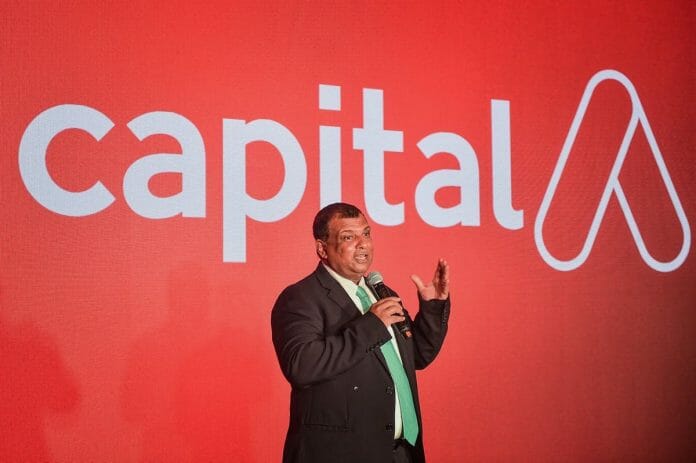AirAsia parent Capital A has embraced partnerships with other carriers in a departure from its strategy of going it alone as CEO Tony Fernandes faces one of his biggest turnaround challenges yet.
Capital A announced on Oct. 2 that Teleport, its cargo transport business, and China’s SF Airlines had agreed to share each other’s Southeast Asian and Chinese networks in a bid to capture growing cross-border e-commerce demand.
This deal followed a strategic partnership announced in September with Garuda Indonesia that allows passengers to plan itineraries with transfers between AirAsia and Citilink, the Indonesian flag carrier’s low-cost arm. The plan includes expanding ties to code-sharing services, not only with Citilink’s flights but also Garuda’s, Capital A told Nikkei.
In June, Capital A added Citilink to a list of rival carriers that the Malaysian low-cost carrier makes available for its customers to book.
The alliance with Garuda is a bitter pill to swallow for a company that had prided itself on defying the odds. Yet since entering Indonesia, AirAsia has struggled to break into a market dominated by budget airline rival Lion Air.
Fernandes built AirAsia from a bankrupt Malaysian airline he acquired in 2001 for 1 ringgit ($0.21 at current rates), battling regulators to create Southeast Asia’s first full-fledged low-cost carrier. As Malaysia’s relatively small population of 33 million people limited domestic growth potential, he expanded by branching out into nearby countries.
But outsiders can have a tough time in the heavily regulated airline industry. AirAsia suffered from thin profit margins even before the COVID-19 pandemic amid stiff competition. After the pandemic struck, it decided to withdraw from Japan and India.
Now Fernandes is trying to pull Capital A out of a deep dive. The company swung to a net profit of 1.18 billion ringgit ($247 million) in the January-June period, compared with a 1.84 billion ringgit loss a year earlier, as travel demand recovered. But after its extensive pandemic losses, its liabilities still outweigh its assets, by 10.2 billion ringgit.
Malaysia’s stock exchange has designated Capital A’s stock PN17, a label for companies in financial distress. To remove that status, a restructuring plan must be submitted and approved by the exchange, something the company has yet to do, leaving it in danger of delisting.
As a part of its restructuring, Capital A plans to submit a proposal to improve efficiency by merging AirAsia’s operations in Malaysia, Thailand, the Philippines and Indonesia, which had been operating as individual companies, with medium- and long-haul carrier AirAsia X as a consolidated airline group.
Fernandes has been optimistic about air travel demand, saying AirAsia will be able to operate all 204 aircraft in its fleet by the end of December.
But its recovery is trailing major competitors. “The failure to leverage the inflation trend to offset higher fuel costs is likely one of the reasons behind this,” said Hebe Chen, a market analyst at IG International. “As global inflation cools down, Capital A’s journey to get back on track will likely become even harder.”
The Asian Development Bank warned in a May report of the increasing risk of overcapacity and “irrational” competition in the region. It said: “The lack of any significant consolidation during the pandemic makes it harder for the Southeast Asian airline sector to achieve sustainable profitability in the post-pandemic environment. Several Southeast Asian markets were already suffering from too many airlines before COVID-19. While such intense competition is good for consumers, it is not sustainable in the long run.”
To complement the low-cost carrier business, Fernandes has built up the company’s digital arm, recently rebranded as Move. Originally an app for airline tickets, it has expanded its services to include hotel reservations and ride-hailing.
Capital A’s shift toward collaboration is also apparent in the digital sector, where it has partnered with German food delivery app Foodpanda.
Capital A aims to increase sales from nonaviation businesses to around 50% of the total. The change in its holding company name from AirAsia Group to Capital A in January 2022 was a sign of its intention to break its dependence on aviation.
But competition from Southeast Asian superapps like Singapore’s Grab and Indonesia’s GoTo will make it difficult for latecomer Capital A to get its foot in the door.
Fernandes has overcome crises in the past. After an AirAsia Indonesia plane crashed in 2014, he worked to restore trust in the airline and return it to a growth path.
The coronavirus pandemic proved to be a big enough blow to AirAsia that Fernandes sold his stake in his beloved Queens Park Rangers, a U.K. soccer club he became co-owner of in 2011, pledging to give “100% of my focus in rebuilding the airline business and expanding digital companies.”
Fernandes, who founded AirAsia at the age of 37, will turn 60 in April.
“Good leadership is to know when to go,” he said during a Bloomberg interview in April this year. But he has reportedly told associates that he has no plans to retire until the company’s restructuring is complete. – Nikkei Asia









